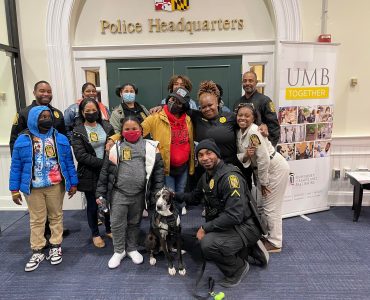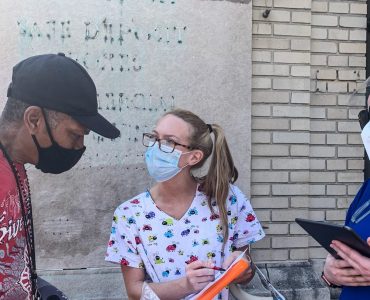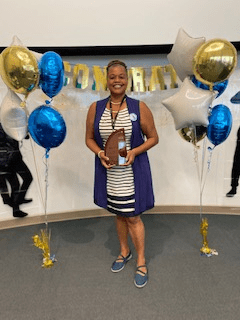
When Thevella “Thee” Thomas of West Baltimore came to the University of Maryland, Baltimore (UMB) Community Engagement Center’s (CEC) Workforce Wednesdays program to seek help developing her job skills, she was dealing with the pain of losing her parents and her sister. Now, after the program guided her back into the workforce, she is an award-winning employee at the University of Maryland Medical Center (UMMC) who helps patients and their families during their time of need.
“I was unable to cope with my losses and began to seek professional grief counseling, where I heard about UMB’s Workforce Wednesdays,” Thomas said. “I received one-on-one support with writing, brainstorming, and intellectual development skills. These skills allowed me to regain my strength and my willingness to live beyond pain and loss.”
Thomas, who started working at UMMC in 2019 as a patient and family care liaison in the Cardiac Surgery Intensive Care Unit after the program referred her to the position, recently received the hospital’s 2023 Edward Rogers Award for her outstanding dedication to patients, families, and staff.
In the nomination, she was described as embodying “the art of caring. She takes wonderful care of our families in the most stressful time of their lives. She assists the nurses greatly through the care and compassion that she provides for our family members to allow us to focus more on the patient’s immediate needs without worrying that the family is alone and not receiving updates.”
Thomas praised the Workforce Wednesdays walk-in program, which provides one-on-one guidance about job resources in the area, résumé writing, and applications.
“I highly recommend the Workforce Wednesdays program to everyone I know because it trains our community with support and skills for job readiness to live a better life,” Thomas said.
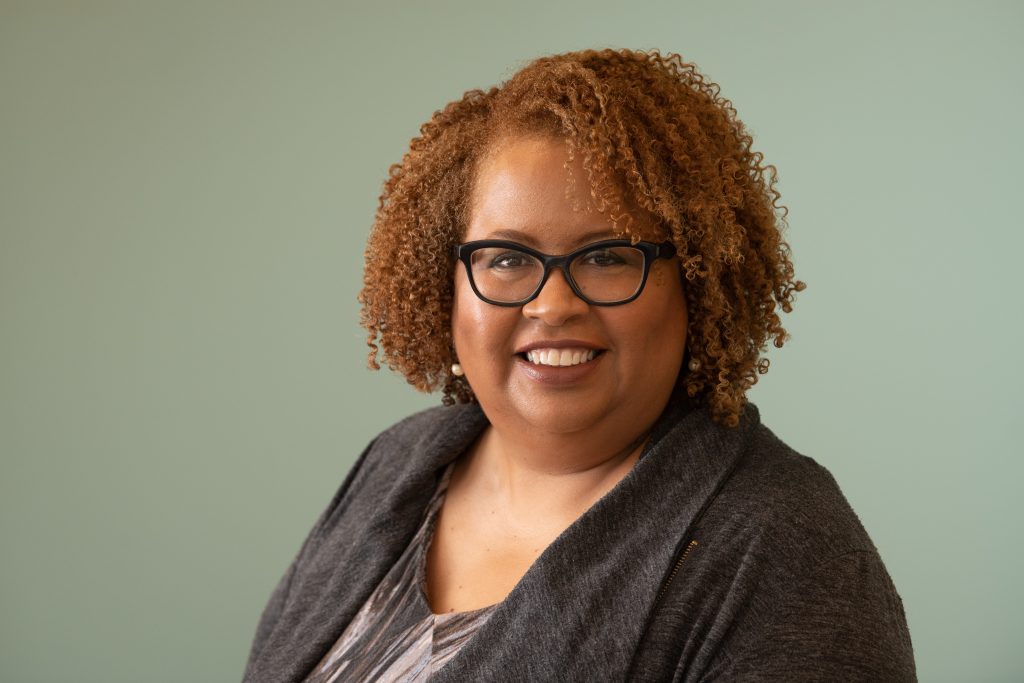
Lisa Rawlings, MBA, director of workforce development and job readiness at the CEC, said when the CEC was created, the No. 1 request from community members was jobs. She said there are many benefits for residents who turn to the CEC for help when job hunting.
“If our neighbors are looking for a job, I encourage them to work with us because job seekers should work with their connections,” she said. “Most people are good at doing their jobs, not looking for a job. We do this every day.”
Administrative Assistant Program
Workforce Wednesdays is just one of the CEC’s offerings to the West Baltimore community to help job seekers gain the skills needed to get on the right track. UMB also has teamed with nonprofit Humanim since 2016 for its Administrative Assistant Career Training, which has resulted in about a dozen program graduates finding employment at UMB or UMMC.
The Humanim program is a free, nine-week course funded by EARN Maryland, a state-funded, competitive workforce development grant program. The program has trained more than 20 students at the CEC over the past year. The fall cohort has launched with 12 students.
The students spend two weeks on professional development including a day of financial literacy; two weeks on Microsoft Office specializing in Outlook; and four weeks on the Professional Administrative Certification of Excellence. The last week is spent visiting employer partners and celebrating with a graduation. Students apply and interview for jobs like other applicants, but because of the partnership, the program can connect students with hiring managers for specific positions.
“We recommend this training to the community at large,” Humanim training manager Wini Alexander said. “We know that this training changes lives, both the students’ and their families’.”
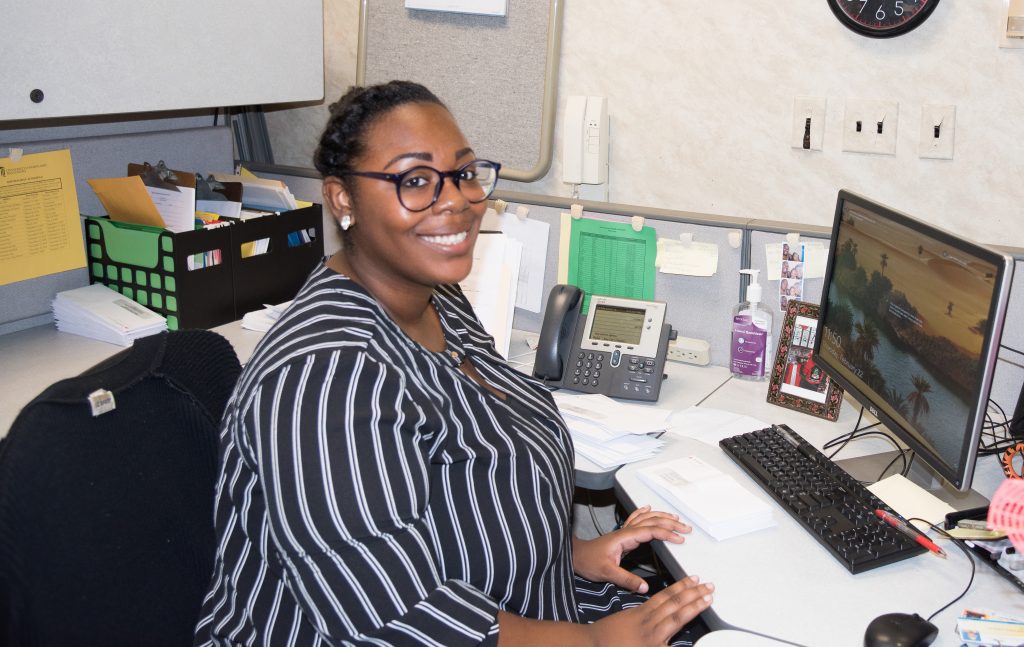
Shakiara Seals, administrative assistant, Environmental Health and Safety, UMB, says joining the Humanim program “changed the course of my life.”
“Going to class every day and being able to receive this top-tier training for free was an amazing opportunity,” said Seals, who was part of the first cohort in fall 2016. “It was a mix of life skills and workforce skills. I was provided coaching, professional development resources, and tools to develop and enhance my administrative skill sets.”
Seals was hired by UMB in spring 2017 as an office clerk and was promoted to her current job in 2019. She praised Alexander for her support in the program and encouraged others who might be interested in an administrative assistant career to enroll.
“Wini Alexander is a huge part of my success,” said Seals, who returned to the program last year as the graduation speaker. “She gave me a chance and knew what I could do before I even thought about it. She was my one ‘yes’ when I was a ‘no.’ Her dedication to each cohort and investment are the reasons this training was successful for me.”
Because the program runs 9 a.m. to 3 p.m. Monday through Friday, Seals said balancing her personal and professional life was one of her biggest challenges.
“I was a single mom trying to finish college, and I had worked two jobs that I quit for this training. I put my all into it, and it wasn’t easy. You had to put the necessary work and time in to see results,” she said.
Encouragement Is Invaluable
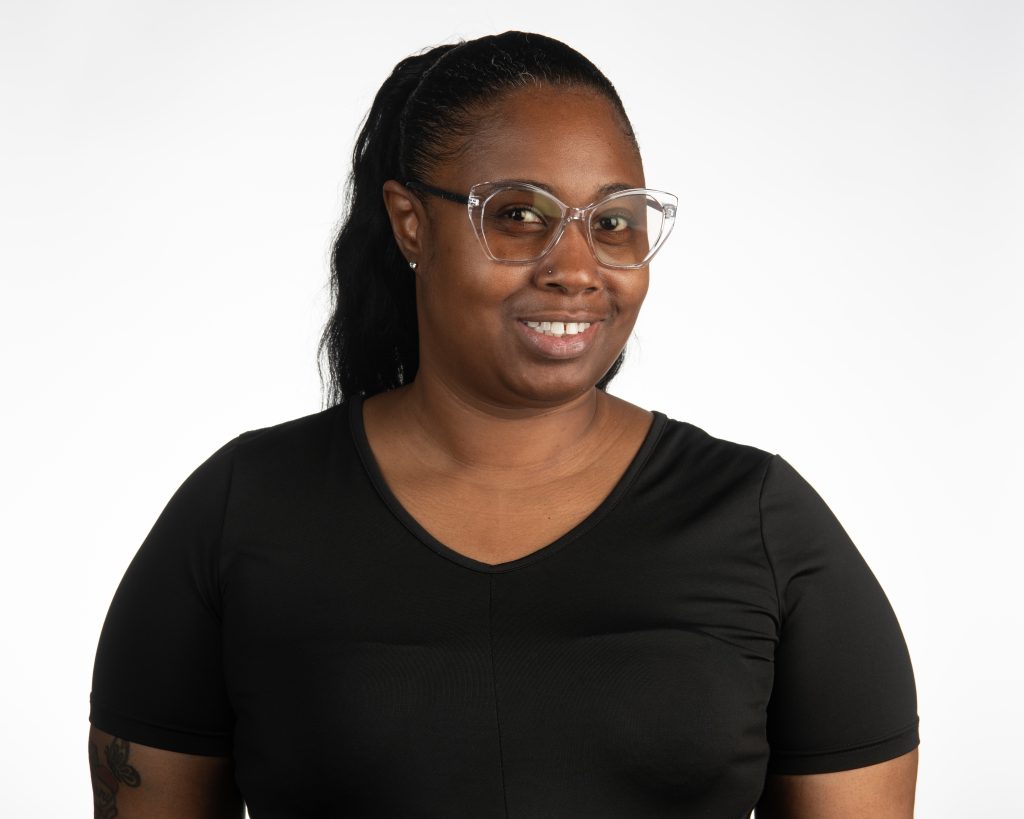
Shantice Matin, administrative assistant, UMB CURE Scholars Program, agreed that the Humanim program and Alexander made an impact on her. Matin enrolled in the course in 2022 because her event planning and custom goods business was affected by the pandemic.
“Humanim’s training was very well put together and intuitive. One of the most instrumental components to the training is not just what is being taught, or even how, it’s who,” she said of Alexander and case manager Ricky Silva. “I was able to rest assured knowing I was heard and I was seen.
“Coming from my background as a business owner, not having had another job in over 16 years, there were plenty of times that I counted myself out. Humanim’s team wouldn’t allow that. I was shown how to recognize my strengths and skills that are instrumental to my current position. That encouragement made an invaluable world of difference to me.”
Alexander said conducting the training is a memorable experience for her as well. “Seeing positive changes in the graduates is rewarding,” she said. “They move forward with confidence and get the job that they’ve always wanted.”
Matin added that the class went beyond just workforce readiness, teaching how to vet a job opportunity. This included learning about researching prospective workplaces based on culture, room for growth, and compensation packages such as benefits.
Rawlings pointed out that the residents who take part in the programs at the CEC are not the only ones who benefit; employers such as UMB and UMMC do as well.
“Employers find great workers who know our community,” she said. “Our employer partners understand how valuable that is, sometimes more than our neighbors. Helping someone see how much they know, how much they’ve accomplished, how valuable they look to potential employers, that is fun.”


